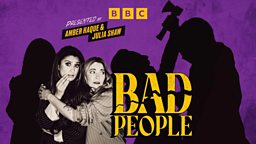What We Get Wrong About Psychopaths
by Dr Julia Shaw
In a recent episode of the ������̳ Bad People podcast, journalist Amber Haque and I cover the dark and intriguing case of Steven Grieveson. Nicknamed, the "Sunderland Strangler”.
Grieveson stood in the dock at Newcastle Crown Court in 2013 to face his fourth charge of murder.
Already serving a life sentence for the murders of three teenage boys in Sunderland in 1993 and 1994, Grieveson was now accused of the 1990 murder of 14 year old Simon Martin. He admitted the killing but would not plead guilty to murder. He pleaded guilty to the lesser charge of manslaughter on grounds of diminished responsibility. It was left to the jury to decide: murder or manslaughter?As part of his defense, it was argued that he suffered from an abnormality of mind due to “antisocial personality disorder with psychopathy”. The jury in Newcastle Crown Court was tasked with figuring out whether this meant that Grieveson had diminished responsibility.
If we break this down, what does it really mean for someone to have psychopathy? And, what is antisocial personality disorder?

I’m a criminal psychologist, and it bothers me that almost every time people use these terms, they use them incorrectly. I’m here to show you how it’s really done. To give you a brief guide on how to use the term psychopath correctly.
Who is a psychopath?
First of all, someone “with psychopathy” is “a psychopath”. Meanwhile, psychopathology, is the scientific study of all mental health disorders. Sometimes people interchangeably use the term psychopath and sociopath. Don’t do this. Sociopath is an outdated term that psychologists do not use. It’s not used in any current psychological manual for mental disorders, and academics like me also never use the term.
How does someone get labelled a psychopath?
Psychopathy is typically measured using a checklist. The two most popular ones are the Psychopathy Checklist (PCL-R) and the Psychopathic Personality Inventory (PPI). The PCL-R is used by psychologists, often in criminal settings. The PPI is self-report, which means you don’t need someone else to do it, and it was created with non-criminal contexts in mind.
Psychopaths are probably most famous for their signature trait: a lack of empathy. But to count as a psychopath someone needs to have a lot more problematic traits than that. For example, on the PCL-R, a lack of empathy can only get you 2 points. You need to score at least 25-30 out of the possible 40 points in order to be called a psychopath. That means also having traits like superficial charm, a grandiose sense of self-worth, shallow emotions, impulsivity, a lack of realistic long-term goals, and criminal versatility, just to name a few.
Psychopathy isn’t really a “diagnosis”
Something that surprises most people is that psychopathy isn’t actually a formal diagnosis. It’s not in the major handbooks that psychologists and psychiatrists use for diagnosing psychological disorders. So calling someone a “diagnosed psychopath” always feels wrong. The way criminal psychologists talk about it is less sexy, but more accurate. We typically say that a person “meets the criteria for psychopathy”.
But even more commonly in psychological circles you will see the related diagnoses used that are in our handbooks: Antisocial Personality Disorder and Dissocial Personality Disorder.
What is Antisocial/Dissocial Personality Disorder?
In criminal psychology, researchers like me have long written about Antisocial Personality Disorder (ASPD), which is characterized by a pervasive and enduring pattern of disregarding, and violating, the rights of others. It’s a broader diagnosis than psychopathy.
Dissocial Personality Disorder is synonymous with Antisocial Personality Disorder. It is the term used by the ICD, the International Classification of Diseases (ICD-11), a diagnostic manual used by psychologists in Europe. It’s the handbook that NHS doctors in the UK use as well.
Antisocial Personality Disorder is what I learned to call it during my PhD because I studied in Canada. It’s in the North American handbook for psychologists, the Diagnostic and Statistical Manual of Mental Disorders (DSM).
Is there a difference between psychopathy and Antisocial/Dissocial Personality Disorder?
Yes. Psychopathy is sometimes thought of as an extreme, more violent, type, of ASPD.

Can psychopathy be cured?
No. It is a personality disorder, and these are thought to be something that people live with forever. Researchers like Jennifer Skeem have developed programs to help people in prisons manage their psychopathy, by living more prosocial lives. It shows promise, but this kind of specialised treatment programme is rare and doesn’t always work.
Can I tell if a child is a psychopath?
Many children and adolescents have a phase of perpetrating minor crimes and being generally disruptive. Psychologists call this adolescent-limited delinquency. Because most young people grow out of it, they wouldn’t be called psychopaths.
That being said, there is a youth version of the Psychopathy Checklist, the PCL-YV, which can help mental health providers better address the needs of more severely troubled teens. Psychopathy, ASPD and DPD all typically first emerge in childhood or early adolescence, and they continue through an individual's life.
Are psychopaths violent?
One of the biggest misconceptions about ASPD and Psychopathy is they lead directly to violent behavior. But psychopathy doesn’t affect your ability to differentiate right and wrong. It also doesn’t make you lose control.
In fact, many individuals with psychopathy are able to function in society without committing violent crimes. The person who created the PCL-R, Robert Hare, often talked about how many psychopaths are probably living out their empathy-limited tendencies in corporate jobs. Another term that’s been used is pro-social psychopath, which refers to people who compensate for their lack of empathy by learning social rules and deciding to do things that are helpful rather than harmful.
Back to the Sunderland Strangler
In Grieveson’s case, experts agreed he suffered from Antisocial Personality Disorder with psychopathy. Symptoms cited included a lack of remorse, emotional vulnerability, and a long history of antisocial behaviour dating back to his childhood. But did it explain his crimes? Or mean he should be seen as having diminished responsibility? No.

Grieveson’s murders were highly calculated, and the prosecution argued that he knew exactly what he was doing when he killed his victims. He was driven by a specific motive, to prevent the disclosure of his homosexuality, and his actions were deliberate, not impulsive. The jury at his 2013 trial agreed.
Grieveson’s trial highlights a broader issue with the way psychopathy is used in legal cases. In 2020, the Sentencing Council for England and Wales issued guidelines advising judges to avoid using the term “psychopathic disorder,” as it is considered both pejorative and unscientific.
To hear the full case of the Sunderland Strangler, listen to episode “112: Four Boys” of Bad People on ������̳ Sounds. Check out the full back catalogue to hear other fascinating insights from the world of criminal psychology.
Dr Julia Shaw is a criminal psychologist at University College London. She is also the author of multiple books, including Making Evil: The Science Behind Humanity’s Dark Side.
